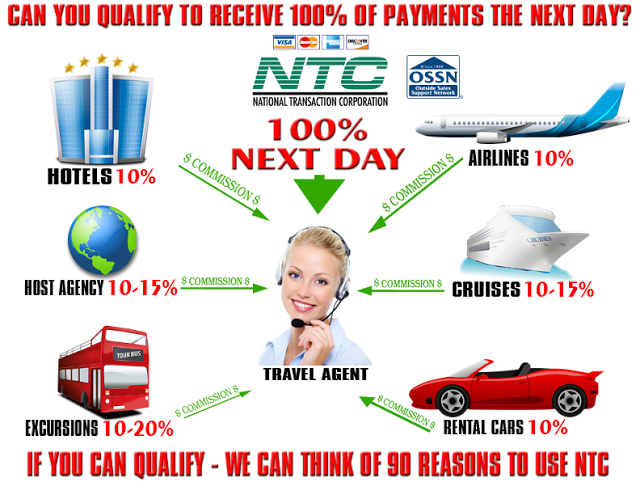
December 18th, 2024 by Elma Jane
What makes your travel merchant account high risk?
Travel environments are unique and transactions are usually keyed in. There’s almost always a delayed delivery period, and large ticket transactions.
One card holder may be paying for multiple tickets and they tend to be seasonal; with peak season months generating an unusual spike in their “average” monthly volume and chargebacks, pose a potential threat by travelers who are unable to complete their trip.
These factors can cause for either a reserve or account termination. Therefore travel merchant accounts are considered high risk.
Most merchants do not realize that merchant processors carry a financial risk on merchant accounts, and normally fund merchants prior to receiving payment from the client’s bank. Therefore, a merchant account is an unsecured loan.
The merchant runs a transaction and at the end of the day they settle their batch. The merchant will receive the funds for that batch in their bank account within 2 business days, even though the travel arrangements the client paid for do not take place right away.
Here at National Transaction Corp, we specialize in understanding what makes your transactions as a travel agent unique and how they affect your merchant account.
Educating the merchant and ensuring they have a good understanding of what makes travel merchant account high risk, is one of our specialties.
Call NTC to speak with a Travel Merchant Account Specialist today!
Dial 888-996-2273
Posted in Best Practices for Merchants, Travel Agency Agents Tagged with: bank, card, chargebacks, financial, loan, merchant, payment, processors, transactions, travel, travel agent, Travel Merchant

September 20th, 2024 by Elma Jane
Merchant Account Risks for Travel Agencies
The travel industry, with its high-value transactions and international clientele, faces unique challenges when it comes to credit card processing. While accepting plastic is crucial for smooth booking and customer convenience, travel agencies must be aware of the inherent risks and implement strategies to mitigate them. Here’s a breakdown of the key credit card processing risks and how to minimize them:
1. Chargebacks:
- The Problem: Travel plans change, flights get delayed, and unforeseen circumstances arise. This can lead to a higher rate of chargebacks, where customers dispute charges with their credit card company. Chargebacks can be costly, involving fees, lost revenue, and potential damage to your merchant account reputation.
- Mitigation:
- Clear Cancellation Policies: Crystal-clear terms and conditions regarding cancellations, refunds, and travel changes are essential. Ensure these are easily accessible during booking.
- Thorough Documentation: Maintain detailed records of all transactions, customer communications, and travel itineraries. This provides evidence in case of a dispute.
- Proactive Communication: Keep customers informed about any changes to their travel plans and address concerns promptly.
- Secure Payment Processing: Utilize 3D Secure (like Verified by Visa or Mastercard SecureCode) for added authentication and fraud prevention.
2. Fraud:
- The Problem: The travel industry is an attractive target for fraudsters due to high transaction values and the potential for anonymity. Fraudulent activities can include using stolen credit card details, booking fictitious trips, or exploiting vulnerabilities in online booking systems.
- Mitigation:
- Address Verification System (AVS): Verify the billing address provided by the customer against the address on file with the credit card company.
- Card Security Code (CVV): Always require the CVV code for card-not-present transactions.
- Fraud Detection Tools: Implement fraud screening tools that analyze transactions for suspicious patterns and flag potentially fraudulent activity.
- PCI DSS Compliance: Adhere to the Payment Card Industry Data Security Standard (PCI DSS) to ensure secure handling of sensitive cardholder data.
3. Currency Fluctuations:
- The Problem: International travel often involves transactions in multiple currencies. Fluctuating exchange rates can impact your profit margins and create uncertainty in pricing.
- Mitigation:
- Dynamic Currency Conversion: Offer customers the option to pay in their home currency, providing transparency and potentially reducing chargebacks related to exchange rate discrepancies.
- Hedging Strategies: Explore financial instruments to mitigate currency risk, such as forward contracts or currency options.
4. High Processing Fees:
- The Problem: Travel agencies often face higher processing fees due to the perceived risk associated with the industry.
- Mitigation:
- Negotiate with Processors: Shop around and compare rates from different credit card processors. Don’t hesitate to negotiate for better terms, especially if you have a high volume of transactions.
- Consider Interchange-Plus Pricing: Opt for transparent pricing models like interchange-plus, which separates the interchange fee (charged by card networks) from the processor’s markup.
5. Technological Challenges:
- The Problem: Keeping up with evolving payment technologies and security standards can be challenging. Outdated systems can increase your vulnerability to fraud and data breaches.
- Mitigation:
- Invest in Secure Technology: Use a robust and secure online booking system that integrates with reputable payment gateways.
- Regular System Updates: Ensure your software and security protocols are regularly updated to address emerging threats.
- Partner with Reliable Providers: Choose payment processors and technology vendors with a strong track record of security and reliability.
By understanding and proactively addressing these credit card processing risks, travel agencies can protect their business, enhance customer trust, and navigate the exciting world of travel with greater financial security.
Posted in Best Practices for Merchants, Travel Agency Agents Tagged with: card, card-not-present, cardholder, chargeback, credit card, customer, fraud, high-risk merchants, merchant account, merchants, payment, processors, risk, transaction, travel, travel agencies, travel agency, travel agents
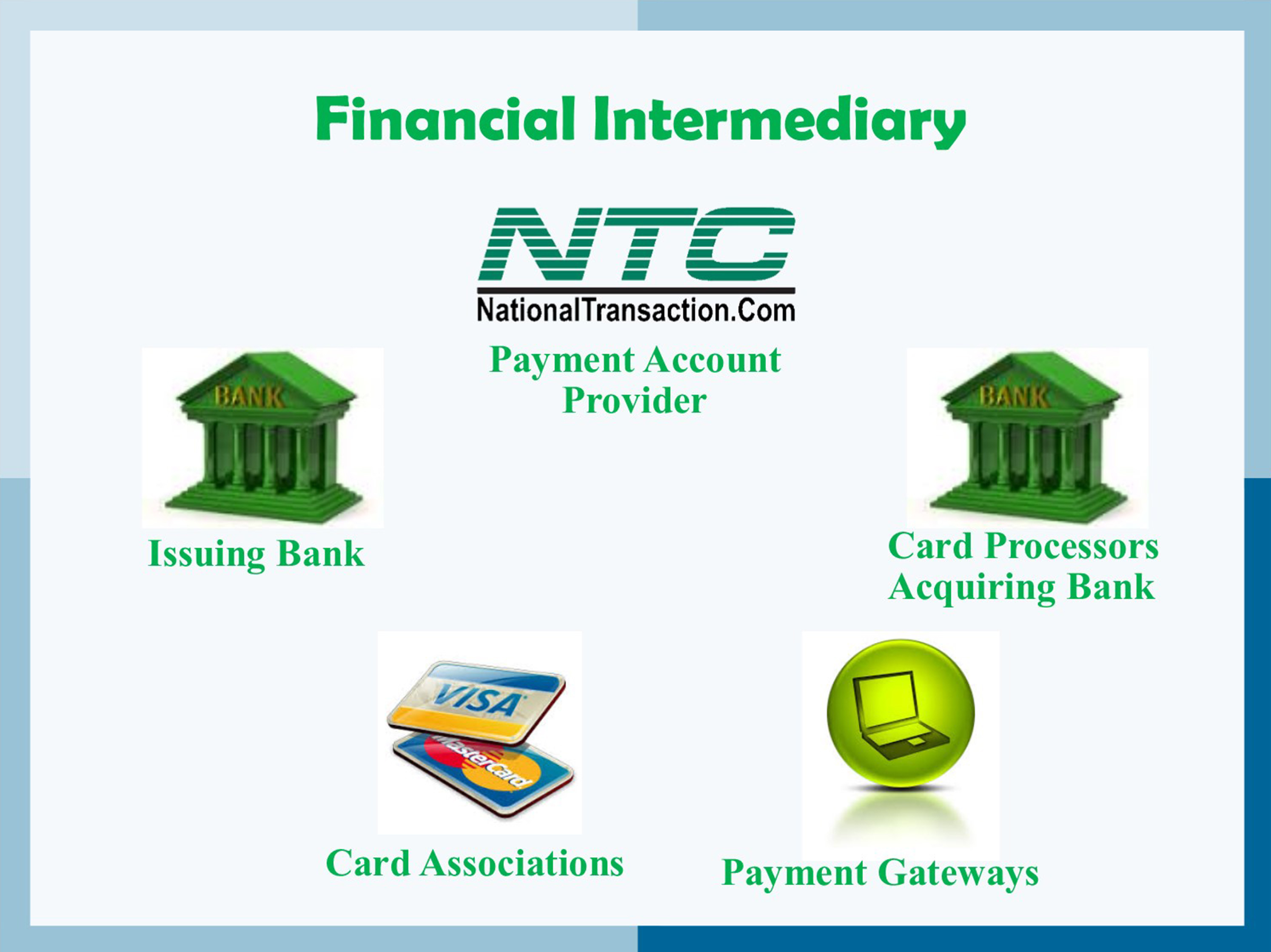
March 7th, 2017 by Elma Jane
Financial intermediary between a customer and merchant include:
Card Associations – Visa, MasterCard, and American Express.
Card Issuing Banks – are the financial institutions affiliated with the card association brands and provides credit or debit cards directly to customers.
Card Processors – also known as Acquirer or Acquiring Banks. They pass batch information and authorization requests so that merchant can complete transactions in their businesses. These institutions are the link between payment account providers and card associations.
Payment Account Providers – are companies like NTC that manage credit card processing, usually through the help of a Card processor also known as Acquiring Banks.
Payment Gateways: These are special portals that route transactions to a card processor or acquirer.
Posted in Best Practices for Merchants Tagged with: banks, card associations, credit, customer, debit cards, financial, gateways, merchant, payment, processors, provider's, transactions
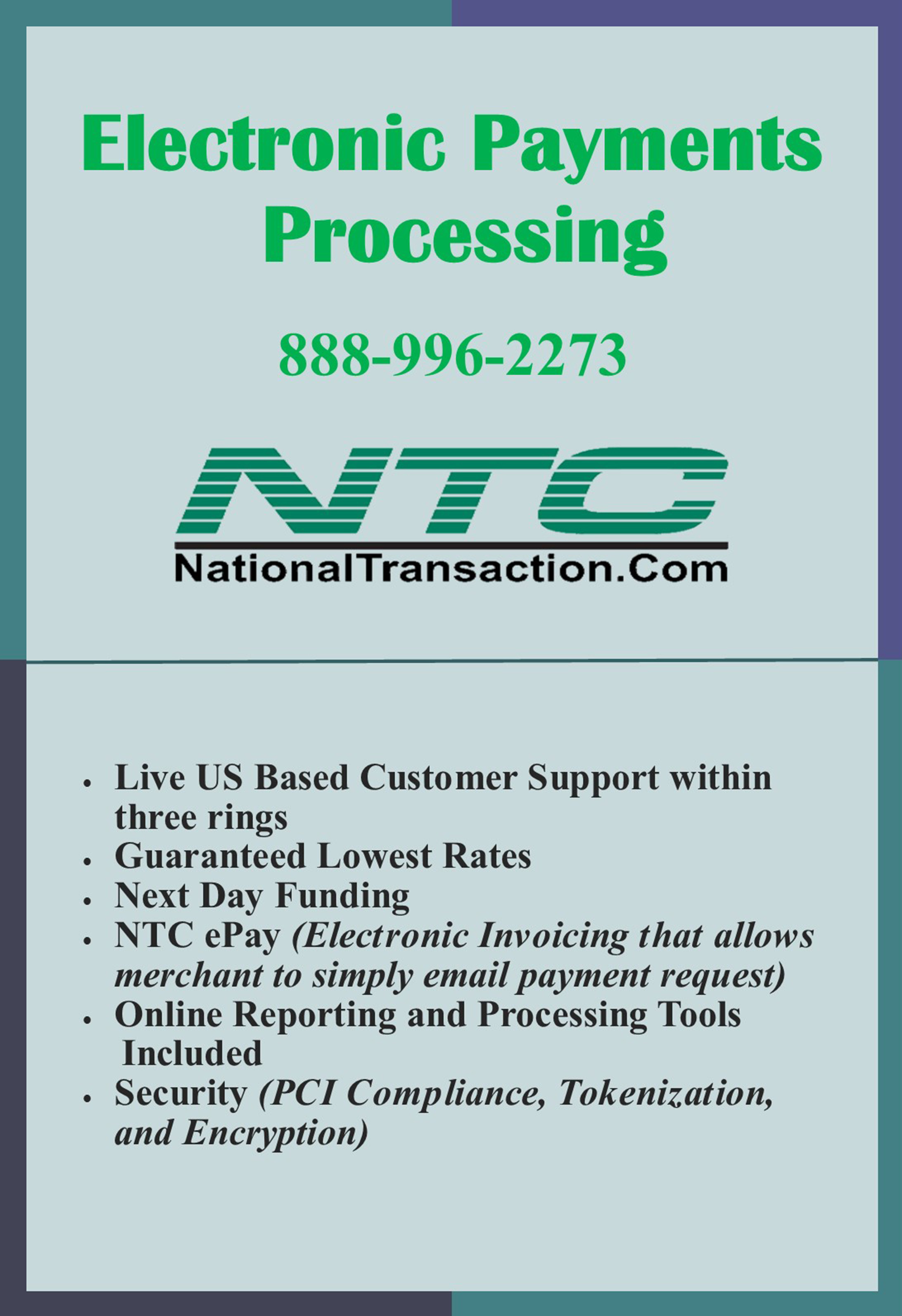
March 6th, 2017 by Elma Jane
Electronic Payments Processing
Credit and debit card industry grows in electronic payment processors and the services they offer; unfortunately, customer support seems to be considered to be less important.
National Transaction believes that customer support is of greater value. Any merchant would love to get new a new equipment or credit card terminal for free, but what about support for this service? Get the most from your Electronic Payments Processing!
NTC offers the following:
Live US Based Customer Support within three rings
Guaranteed Lowest Rates
Next Day Funding
NTC ePay Electronic Invoicing (allows the merchant to simply email payment request).
Online Reporting and Processing Tools Included
Security (PCI Compliance, Tokenization, and Encryption).
Call us now 888-996-2273 www.nationaltransaction.com
Posted in Best Practices for Merchants Tagged with: credit, customer support, debit card, Electronic invoicing, electronic payment, encryption, merchant, payment, payment processing, PCI, processors, Security, terminal, tokenization
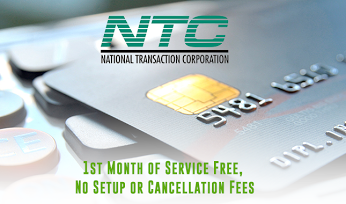
October 14th, 2016 by Elma Jane
Merchant Account is a LOAN!
Merchant accounts are not depository accounts like checking and savings accounts; they are considered a line of credit. Therefore, when a customer pays with a credit card; a bank is extending credit to that customer and also making the payment on his/her behalf. As for processors or payment providers; they pay merchants before the banks collect from customers and are therefore extending credit to the merchant, that’s why Merchant account is considered as a LOAN.
Posted in Best Practices for Merchants, Financial Services, Travel Agency Agents Tagged with: bank, credit, credit card, customer, loan, merchant, merchant account, payment, payment providers, processors
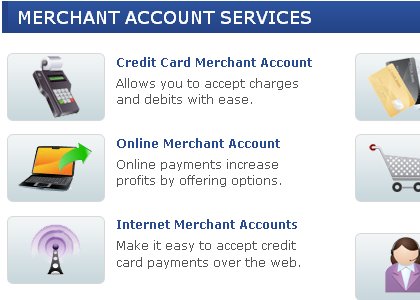
September 30th, 2016 by Elma Jane
The Process of Underwriting!
Some of the key things that are reviewed in setting up electronic payments.
Getting a merchant account, is an important step for any businesses that sells services.
Merchants need to understand the following process:
Billing policy – Businesses that bill too far in advance are at greater risk for a chargeback. Knowing how does the business bill is important.
Example: A travel agency who sold travel destination packages six months in advance and cancel the trip.
Business type – Businesses at a higher risk are industries with vague products or services; which are more highly to be examined in detail than those with concrete offerings.
Chargeback history – A business with a lot of chargebacks tied to their old merchant account will have a hard time with underwriting. A chargeback can be issued by the cardholder; if the merchant does not fulfill the product or services being rendered as agreed.
Owner/signer credit score – Credit score plays a big role during merchant account underwriting. However, some processors will review financial statements instead in the case of poor credit. if the original signer’s credit score is insufficient, businesses with multiple partners can also try the application with a different signer.
Requested volumes – This are weighed against the processing volumes requested on the application. New businesses usually start with smaller volumes to build a trustworthy relationship before increasing their processing volumes.
Years in business – Long terms in business go a long way in merchant account underwriting; it speaks for their legitimacy and they are more prepared to respond to something like a chargeback and often have a more stable cash flow.
Posted in Best Practices for Merchants, Travel Agency Agents Tagged with: cardholder, chargeback, credit, electronic payments, merchant account, processors, travel agency

July 13th, 2016 by Elma Jane
Monthly statement fee is a fixed fee that is charged monthly and is associated with the statement that is sent to a merchant in one billing cycle, approximately 30 days worth of credit card processing by the merchant account provider; whether it’s a printed one, a mailed statement or an electronic version. Requesting online statements won’t necessarily be able to waive statement fee.
Every credit card and merchant account provider have a different set of costs associated with its services, but remember that there are several processors out there that are very transparent with their fees like National Transaction.
Posted in Best Practices for Merchants, Travel Agency Agents Tagged with: credit card, fee, merchant, merchant account, processors, provider, services

May 4th, 2016 by Elma Jane
Credit Card Terminal for…..
Some processors offer a free terminal to their merchants, but as we all know, there ain’t no such thing as a free lunch! A free terminal carries with it a yearly Terminal Replacement or Warranty charge of $50 to $100/year. That’s still much less than what a lease would cost you, but it’s not really FREE
If you’re not currently in a lease but are considering one, don’t be deceived. Instead, calculate the total cost of leasing vs. owning. The best and most affordable option still lies in ownership.
If you need to set up an account give us a call at 888-996-2273
Posted in Best Practices for Merchants, Travel Agency Agents Tagged with: credit card, merchants, processors, terminal

May 4th, 2016 by Elma Jane
Some processors specialize in leasing terminals, but equipment lease locks up merchants and ends up costing you more, whereas you could get that same machine in a matter of months and get more than one.
If you lease a terminal you may also be required to purchase equipment insurance, another added cost. And, have the equipment return at the end of your lease. If a merchant owns an existing equipment, it can be reprogrammed at NO CHARGE and the merchant can continue to use it.
For account set-up, give us a call at 888-996-2273
Posted in Best Practices for Merchants, Travel Agency Agents Tagged with: merchants, processors, terminals

February 8th, 2016 by Elma Jane
The U.S. House of Representatives voted to end the Obama administration’s Operation Choke Point.
The vote was 250-169, which represented a group of all Republicans and 10 Democrats voting to revoke the law.
Operation Choke Point, which began in 2013, leveraged the government’s regulatory power over merchant banks, acquirers and payment processors, forcing them to drop clients engaged in industries like payday lending, firearms and other high-risk sectors especially online like gambling and adult entertainment.
In a statement by U.S. House Rep. Luetkemeyer, the first step has been taken to ensure that federal banking agencies can no longer compel financial or payment institutions from offering financial services to licensed, legally-operating businesses that has been a target not because of potential wrongdoing, but purely on personal and political motivations and without due process.
Posted in Best Practices for Merchants Tagged with: acquirers, banks, financial services, merchant, payment, payment institutions, processors










